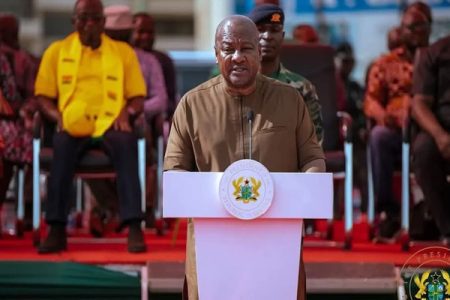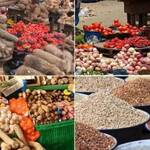President John Dramani Mahama has launched the Feed Ghana Programme, a major government flagship intervention aimed at revitalizing Ghana’s agricultural sector and ensuring national food security.
The launch took place in Techiman, the capital of the Bono East Region, known as a key agricultural hub in the country.
The Feed Ghana Programme includes the establishment of Farmers’ Service Centres in all regions.
These centres will serve as one-stop locations for mechanisation services, access to quality inputs, training, finance, and market linkages.
They are expected to modernise farming practices and empower farmers with the tools needed for success.
A special component of the programme, known as Yeredua, will focus on reducing the country’s dependence on vegetable imports by promoting the local cultivation of tomatoes, onions, peppers, and other vegetables.
Urban and peri-urban agriculture, greenhouse farming, and backyard gardening will all be promoted as part of this initiative.
Another significant project under the programme is Nkoko Nketenkete, a poultry revitalisation initiative that aims to restore Ghana’s poultry industry by improving breeding, feed production, and marketing.
The programme would focus on promoting the production of specific staple foods such as maize, rice, soybeans, sorghum, cassava, yam, and plantain, as well as key vegetables including tomatoes, onions, and chilli peppers.
These crops have been identified as critical to reducing imports and achieving food self-sufficiency.
Beyond staples, the President highlighted the need to scale up production of industrial and export crops such as cocoa, cashew, mango, oil palm, coconut, coffee, shea, rubber, and ginger.
The livestock sector will not be left out, as the programme aims to revitalize poultry, cattle, sheep, goats, and pig production.
Tackling the palm oil deficit
A major area of focus will be Ghana’s palm oil industry. President Mahama noted that although the country currently produces 300,000 metric tons of palm oil, national demand stands at 450,000 metric tons—leaving a deficit of 150,000 metric tons.
Speaking at the event, President Mahama underscored the urgent need to transform agriculture into a more modern, productive, and profitable sector.
He noted that agriculture must no longer be seen as a subsistence activity but as a central driver of economic growth, employment creation, and national development.
Agriculture at the heart of economic strategy
President Mahama stated that Ghana’s reliance on imported food, which currently costs the country approximately $2 billion annually, is economically unsustainable.
He called for a decisive shift away from outdated methods of farming and a stronger emphasis on modern technologies, research, and agro-industrialisation.
He emphasized that Ghana’s natural endowments—including fertile land, ample water resources, abundant sunshine, and a vibrant youth population—offer the country a strong advantage to build a thriving agricultural economy.
However, challenges such as low productivity, limited extension services, weak infrastructure, and poor market linkages continue to undermine the sector’s potential.
Despite these hurdles, the President expressed optimism, pointing to the country’s technical expertise and active research institutions as key pillars for success.
He noted that the Feed Ghana Programme would serve as a comprehensive framework to harness these strengths and implement all future agricultural projects and interventions under one strategic vision.
Driving food security through targeted interventions
President Mahama announced that the programme will focus on increasing food production, improving infrastructure, and establishing agro-industrial zones across the country.
These zones will be equipped to support post-harvest processing, marketing, and export, as well as serve as centers for value addition.
To close the gap, he announced the implementation of a dedicated palm oil policy that will provide incentives throughout the value chain, from cultivation to export.
He added that the Tree Crop Development Authority would take charge of developing six economically valuable tree crops, with emphasis on oil palm.
This move, he explained, is part of Ghana’s strategy to position itself in the rapidly growing global palm oil market, which is projected to reach $65 billion by 2027.
Resourcing institutions to support implementation
At the launch, President Mahama presented tractors, Kia trucks, fertilizers, agrochemicals, and maize seeds to the Ghana Prisons Service and the National Service Authority.
These institutions will play a frontline role in implementing the programme, particularly in mobilizing land and labour for food production.
He also disclosed plans to support Senior High Schools and other institutions with access to land for farming activities.
The goal is to incorporate agriculture into school curriculums and promote food cultivation among students, thereby encouraging the next generation of farmers and agripreneurs.
Laying the foundation for a self-sufficient future
President Mahama reiterated that the Feed Ghana Programme represents his administration’s renewed commitment to food self-sufficiency, economic stability, and rural development.
He stated that modernising agriculture is key to reducing food inflation, generating employment, and achieving sustainable development.
“This is not just an agricultural initiative,” he said. “It is a national development strategy. It is about restoring dignity to farming, feeding our people with locally grown food, and making Ghana a global leader in agro-processing and exports.”
He called on Ghanaians, especially the youth, to see agriculture not as a last resort but as a rewarding and promising career path. He also appealed to stakeholders including traditional authorities, development partners, private investors, and farmer groups to support the successful rollout of the Feed Ghana Programme.
With its multifaceted approach and focus on innovation, the Feed Ghana Programme is poised to become a turning point in Ghana’s agricultural journey, setting the stage for a more prosperous, food-secure future.
- Tuesday, April 15, 2025 Newspaper Headlines - 15 April 2025
- PMMC-issued gold licenses for individuals invalid — Goldbod - 14 April 2025
- KNUST declares 2 former students persona non grata - 14 April 2025

